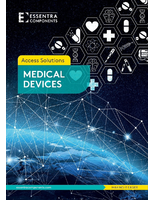3U CompactPCI® SBC features conductive cooling.
Share:
Press Release Summary:

Based on MPC8548 with clock frequencies between 800 MHz and 1.5 GHz, F50C supports rear I/O and comes with CCA frame, which allows SBC to be used in conductive cooling housing in temperature range of -40 to +85°C. It has 2 GB ECC DDR2 SDRAM main memory, 16 GB solid state Flash disk (SSD) for application data, and industrial FRAM and SRAM. SBC also supports up to 3 Gigabit Ethernet channels, 4 USB ports, up to 2 SATA interfaces, as well as user-definable functions inside its FPGA.
Original Press Release:
3U CompactPCI® SBC with MPC8548 and Conduction Cooling for Mobile Application
o 3U CompactPCI® system master or stand-alone
o 5 HP with rear I/O
o MPC8548 (or MPC8543), up to 1.5 GHz
o Up to 2 GB (ECC) DDR2 SDRAM
o FRAM, SRAM, SSD Flash
o FPGA for customized I/O
o -40 °C to +85 °C
Embedded World, Nuremberg, Germany - March 3, 2009. Once again facing the issue of "safety-critical embedded applications", MEN Mikro Elektronik introduces the first 3U CompactPCI board with conductive cooling at Embedded World 2009. The F50C is based on Freescale's MPC8548 and was particularly designed for application in harsh environmental conditions.
Conduction Cooling for Extreme Environments
The new F50C is based on Freescale's MPC8548 with clock frequencies between 800 MHz and 1.5 GHz. The 3U CompactPCI single-board computer supports rear I/O and comes with a specially designed CCA frame for conductive cooling by standard. This frame gives the card 5 HP in size and allows the SBC to be used in MEN's conductive cooling housing in a temperature range of -40 °C to +85 °C. With front I/O and a heat sink for convection cooling the F50P sister board is also available for application in common 19" systems.
The F50C has 2 GB ECC DDR2 SDRAM main memory, a 16 GB solid state Flash disk (SSD) for application data and an industrial FRAM and SRAM.
The single-board computer supports up to 3 Gigabit Ethernet channels, 4 USB ports, up to 2 SATA interfaces and a multitude of user-definable functions inside its FPGA. These may include graphics, touch, serial and fieldbus interfaces as well as binary I/O - depending on the needs of each application. All of the F50C's interfaces are accessible via the J2 rear I/O connector.
All components of the F50C are firmly soldered against shock and vibration. In addition, the card is ready for coating against dust and humidity.
MEN Mikro Elektronik - Profile and Mission
Since its foundation in 1982 our company designs and manufactures failure-safe computer boards and systems for extreme environmental conditions in industrial and safety-critical embedded applications. Our mission is to provide innovative solutions while maximizing reliability and flexibility.
With 200 employees and subsidiaries in France and the USA we have an annual revenue of 28 million Euros with an export share of about 50%. Customized solutions make for more than half of our revenue. In addition the standard product range includes far more than 100 different computer boards with Intel Pentium and multi-core processors and PowerPC with the corresponding BIOS, BSP and driver software, manifold I/O boards and completely configured systems based on:
o ESMexpress and ESM Embedded System Modules
o 3U and 6U CompactPCI, CompactPCI Express and VMEbus
o PMC, XMC and M-Modules as system-independent mezzanine I/O standards
The consistent use of FPGA technology gives us high flexibility when configuring customized and standard products.
Our products are used worldwide as control, measuring, test or simulation computers in all kinds of embedded applications. These comprise extremely safety-critical markets such as railways, including buses and commercial vehicles, aerospace technology or the medical industry, but also mechanical engineering, shipbuilding, telecommunications and the automotive industry. Computer systems in such applications are in operation up to 24 hours every day and often need to be available for 10 years and longer. Ideally no failures must occur to avoid costly downtimes of machines or danger to human life.
We are certified to EN 9100:2003 (aerospace), ISO 9001:2000 (quality management) and ISO 14001:2005 (environmental management) in order to meet the severe quality requirements in critical applications and to offer our customers the highest quality in products and services while considering environmental protection and occupational safety on the basis of a recognized quality management system. We are also working on certification to IRIS (railway).
Our aim is to constantly improve and to provide the highest technology and innovation level. Our business ethics is determined by the principles of the United Nations' Global Compact Initiative (human rights, labour, environment and anti-corruption).




